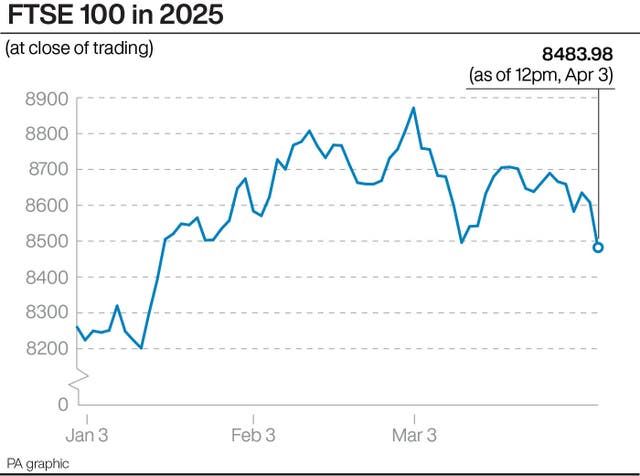London’s FTSE tumbles after Trump’s tariffs send shockwaves through markets
The FTSE 100 Index fell 122.4 points in the first few minutes of trading.

London’s blue chip share index has tumbled lower following heavy falls in Asia after US President Donald Trump confirmed sweeping import levies on the UK and countries across the world.
The FTSE 100 Index dropped sharply on opening, falling 122.4 points or 1.4% in the first few minutes of trading.
European indices suffered steeper falls, with the Dax in Germany and the Cac 40 in France both down more than 2% after Mr Trump’s self-declared “liberation day” saw him announce hefty tariffs on imports into the US, including a 10% penalty for UK goods.
Markets across Asia had endured punishing declines overnight, with the Nikkei in Japan down nearly 3% and China’s Hang Seng 1.5% lower
While the US markets closed higher overnight, pre-market futures trading pointed to sharp declines on Thursday, with the S&P 500, Nasdaq and Dow Jones all expected to open lower, dragged lower by retailers and big tech stocks.
Gold hit another new record high amid a flight to safety, while the pound moved higher against a weaker dollar, up 0.01% to 1.292 US dollars, and held steady at 1.197 euros.
Matt Britzman, senior equity analyst at Hargreaves Lansdown, said: “Trump’s bold attempt to reshape international trade has sent shockwaves through global markets.
“The effects of ‘Liberation Day’ are being felt far and wide, with Asian markets down overnight, European stocks under pressure in early trading, and US futures pointing to a big drop later today.
“With tariffs reaching levels unseen in over a century, the US is poised to rake in an additional 600 billion US dollars in tariff revenue in an optimistic scenario, or put that another way, that’d be a 600 billion dollar added cost for businesses or consumers to stomach.”
The US dollar was falling sharply against key currencies as traders reacted to developments from the US amid uncertainty over how global trade will be impacted by new tariffs, and how far affected countries will respond with retaliatory action.
Chris Beauchamp, chief market analyst at online trading platform IG, said: “Investors and businesses are waking up to a new world this morning after Trump’s tariff announcement.
“Investors have voted with their feet and have resumed the selling of US stocks despite a small overnight bounce.”

“Markets face the kind of trade war not seen for decades.”
Gold hit another fresh record as investors rushed into safe haven assets in the immediate aftermath of the tariff announcements and with bullion also one of the few commodities exempted from the tariffs.
The precious metal raced to an all-time high of more than 3,167.84 US dollars an ounce at one stage, but it pulled back a little on Thursday morning.
Linh Tran, market analyst at XS.com, said: “Unlike previous trade tensions that mainly centred on US–China disputes, this round of tariffs is broader in scope, targeting multiple strategic industries such as electric vehicles, semiconductors, steel, and renewable energy.
“This has raised concerns not only about potential retaliatory measures from affected countries but also about the possibility of a deeper fragmentation of global supply chains in the years ahead.
“The market’s immediate reaction was a widespread shift into defensive mode, with capital flowing out of equities and risk assets and into gold — the traditional safe-haven asset.”
Oil prices also fell as the tariffs are expected to hit global economic growth and dent demand for crude, with Brent oil down more than 3% to 72.4 dollars a barrel.





